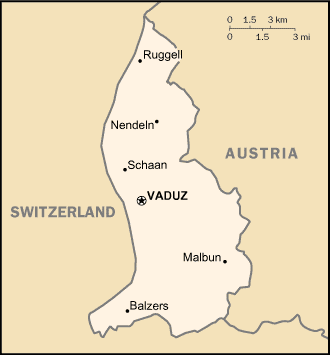Liechtenstein
The Principality of Liechtenstein (German: Fürstentum Liechtenstein) is a tiny, landlocked microstate in Western Europe, bordered by Switzerland to its west and by Austria to its east. Mountainous, it is a winter sports resort, and is perhaps best-known as a tax haven. It is also the only German-speaking country which does not share a border with Germany. The modern territory of Liechtenstein formed at one time (an albeit diminuitive) part of the ancient Roman province of Raetia. For centuries this territory, geographically removed from European strategic interests, had little impact on the tide of European history. Prior to the reign of its current dynasty, the region was enfiefed to a junior line of the House of Habsburg. The Liechtenstein dynasty, from which the Principality takes its name (rather than vice-versa), takes its name from Castle Liechtenstein in faraway Lower Austria, which the family possessed from at least 1140 to the 13th century, and from 1807 onwards. Through the centuries, the dynasty acquired vast swathes of land, predominantly in Moravia, Lower Austria and Styria, though in all cases, these territories were held in fief under other more senior feudal lords, particularly under various lines of the Habsburg family, which several of Liechtenstein princes served as close advisors. Thus, and without any territory held directly under the Imperial throne, the Liechtenstein dynasty was unable to meet a primary requirement to qualify for a seat in the Imperial diet, the Reichstag. The family yearned for the added power which a seat in the Imperial government would garner, and therefore searched for lands to acquire which would be "unmittelbar" or held without any feudal personage other than the Emperor himself having rights on the land. After some time, the family was able to arrange the purchase of the minuscule counties of Schellenberg and Vaduz (in 1699 and 1712 respectively) from an agnatic line of the Habsburg dynasty. Tiny Schellenberg and Vaduz possessed exactly the political status required, no feudal lord other than their comital sovereign and the suzerain Emperor. Thereby, on January 23, 1719, after purchase had been duly made, Emperor Charles VI decreed the counties of Vaduz and Schellenberg raised to the dignity of principality with the name "Liechtenstein" in honor of [his] 'true servant, Anton Florian of Liechtenstein'. It is on this date that Liechtenstein became a sovereign state of the Holy Roman Empire. Ironically, but as testament to the pure political expediency of the purchases, the Princes of Liechtenstein did not set foot in their new principality for several decades. In 1806, the Holy Roman Empire was invaded by France. This event had broad consequences for Liechtenstein: Imperial legal and political mechanisms broke down, while the Holy Roman Emperor abdicated the imperial throne. The Empire itself dissolved. As a result, Liechtenstein ceased to have any obligations to any feudal lord beyond its borders. Modern publications generally (although incorrectly) attribute Liechtenstein's 'sovereignty' to these events. In reality, its prince merely became suzerain as well as remaining sovereign lord. Until the end of World War I, Liechtenstein was closely tied to Austria. However, the economic devastation caused by that conflict forced the country to conclude a customs and monetary union with its other neighbor, Switzerland. During World War II, Liechtenstein remained neutral, while family treasures within the war zone were brought to Liechtenstein (and London) for safe keeping. At the close of the conflict, Czechoslovakia and Poland, acting to seize "German" possessions, expropriated the entirety of the Liechtenstein dynasty's hereditary lands and possessions in Bohemia, Moravia and Silesia - the Princes of Liechtenstein lived in Vienna until 1938. The expropriations (subject to modern legal dispute at the World Court) included over 1,600 km² of agricultural and forest land, including also several family castles and palaces. It is thus little wonder that during the decades of the Cold War, citizens of Liechtenstein were forbidden by Czechoslovakia from even entering that country. In financial straits following the war, the Liechtenstein dynasty often resorted to selling family artistic treasures, including for instance Da Vinci's priceless portrait "Ginevra de Benci", which was purchased by the United States government. However, the economic condition of Liechtenstein improved rapidly. During the decades following, Liechtenstein prospered, its economy modernizing with the advantage of low corporate tax rates which drew many companies to the country. The Prince of Liechtenstein is among the world's wealthiest heads of state, with an estimated wealth of 2 billion dollars. The country's population enjoys one of the world's highest standards of living. This article is licensed under the GNU Free Documentation License. It uses material from the Wikipedia article "Liechtenstein". |
||||||||||

